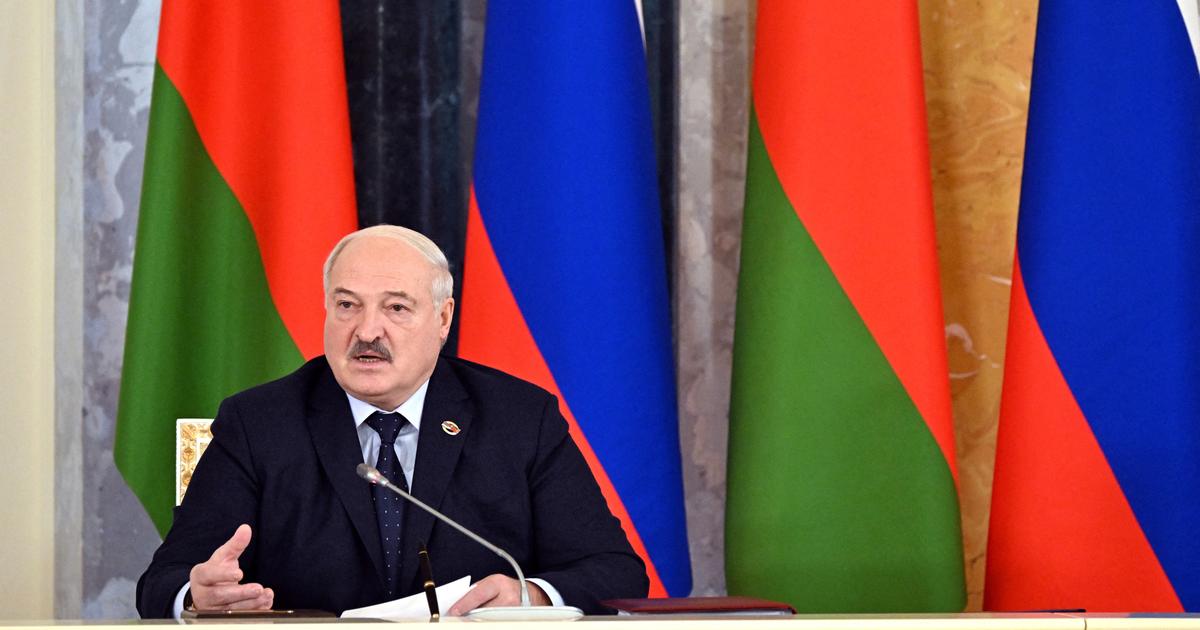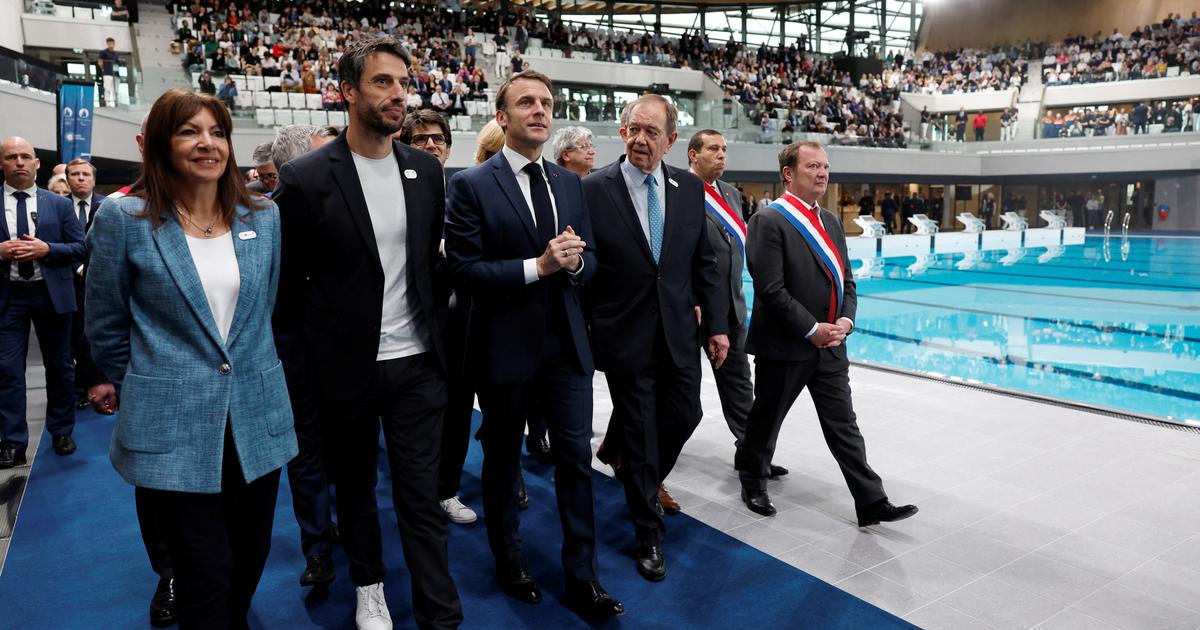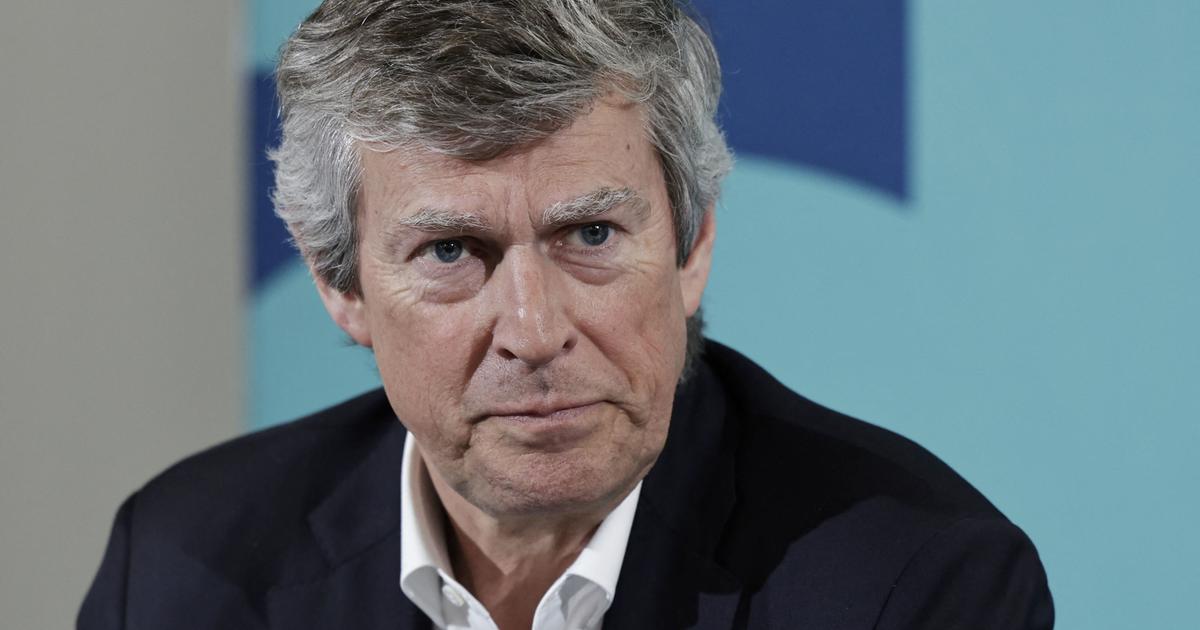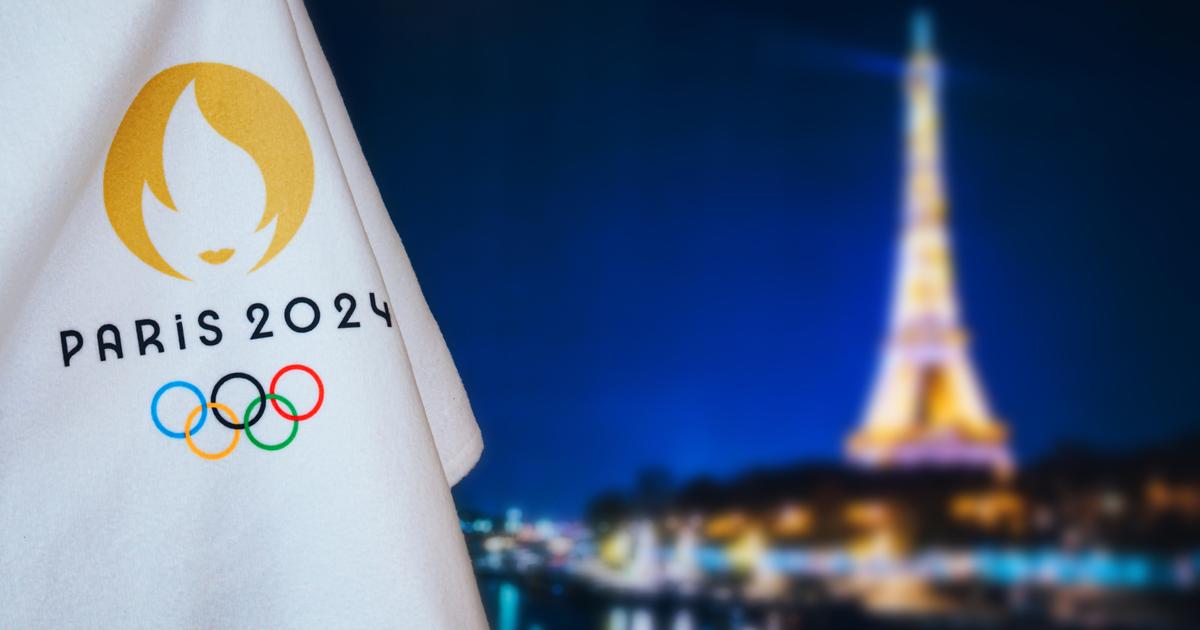Enlarge image
Politician in exile Pavel Latushko together with sprinter Kristina Timanovskaya in Warsaw.
Sports and politics are inextricable was Lukashenko's message to the Belarusian Olympics team before they departed for Tokyo.
Photo: Wojtek Radwanski / AFP
The athlete is sitting on the right, a lithe young woman with dyed-red streaks in her hair whose gaze drops to the floor when she's not speaking. Her name is Kristina Timanovskaya, the Belarusian sprinter who flew from Tokyo to Warsaw via Vienna after being kicked off her country's Olympics team. Now, she is a refugee and could face difficulties if she were to return home. Sitting on the left is Pavel Latushko, an exiled politician who stands in opposition to Belarusian dictator Alexander Lukashenko. Timanovskaya insists that her case has nothing to do with politics, as though that might help her out of the situation in which she finds herself. But the man sitting next to her, along with the numerous microphones and cameras - not to mention the very fact that she is here - would indicate the contrary.
The case of Kristina Timanovskaya, who ran away from her minders instead of returning to the dictatorship back home, has caused a sensation.
People around the world are watching as though it were a reprise of the Cold War: an athlete fleeing from subjugation to freedom;
a dictatorship losing out in the competition with democracy.
Timanovskaya, though, is no dissident.
Belarus does not lie behind an Iron Curtain, and the Cold War came to an end long ago.
But the despotism and fear in Minsk have produced a system that generates political scandals all on its own.
Timanovskaya's case is emblematic of the bizarre dictatorship of Alexander Lukashenko - one in which everything is political because everything is dependent on a single person.
An open letter
Sport is political, that was the message that Lukashenko delivered personally to Timanovskaya and the rest of the Belarusian delegation, speaking in his residence in Minsk on the eve of their departure to Tokyo. Sitting in white suitcoats and light blue skirts and pants, they listened as he told them that victories were "a response to those countries that suffocate us with sanctions." Sports and politics, Lukashenko said, have been inextricably linked since the aggressive, hypocritical West boycotted the Olympic Games in Moscow back in 1980.
Just like the rest of Belarusian society, the world of sport in the country has likewise been divided since the dictator crushed the summer 2020 protests that were triggered by his re-election in a heavily manipulated vote.
In August 2020, Timanovskaya shared a photo on Instagram of her and other protesting athletes standing in front of the Olympic training center in Minsk.
"We cannot stand idly by and continue to accept the violence against citizens, friends, colleagues and relatives," she wrote.
She did not, however, sign the open letter written by Belarusian athletes at the time.
"She said that she supports us, but that she didn't want to speak publicly because she was afraid of repression," says swimmer Alexandra Gerasimenya, the head of the Belarusian Sport Solidarity Foundation who now lives in exile in Lithuania.
Yana Maximova can also be seen on the protest photo. The heptathlete is now 32 years old and recalls how the country's sports minister came to the stadium and expressed surprise that the athletes would say anything about the protests at all. Maximova says that Timanovskaya was defiant in response. She has, says Maximova, "a very, very strong character."
Maximova also ran into difficulties, with the sports minister paying a visit to her home after she took part in protests.
He warned her, she says, asking her what was to become of her family and her young daughter.
Her husband, the track-and-field athlete Andrei Kravchenko, was thrown off the national team.
Maximova wasn't in Tokyo, but she has also decided to never return to Belarus again and is currently in Germany.
"We are afraid that after the Olympics, they will arrest athletes who voice criticism," she said in a telephone call.
"It's Not a Joke!"
Timanovskaya was allowed to travel to Tokyo despite her critical stance. As a sprinter, she has never quite risen to world-class status. She is currently in 37th place in the world rankings in the 200-meter dash and 69th in the 100 meters. She has never managed to advance beyond the semi-finals in either discipline in European and world championships. Last Friday, three weeks after the reception at Lukashenko's residence, she was in Lane 9 for her 100-meter qualifier. She ran a time of 11.47 seconds, coming in fourth but missing the semifinal.
Before she could run in the 200-meters, though, she learned indirectly that she had been put on the 4x400-meter relay team, a distance that she was completely unfamiliar with.
"That's like having a rower take part in a canoeing competition, or putting a high-jumper on the high dive platform," says Alexander Opeykin, director of the Belarusian Sport Solidarity Foundation, on the organization's video blog.
Timanovskaya exploded in anger at the lack of professionalism displayed by her country's sports functionaries.
"Why do we have to pay for your mistakes?"
she demanded in an emotional Instagram post. "Hello? This is the Olympic Games. It's not a joke!"
Her minders responded by saying that she would be sent home.
A Fly in a Spider's Web
There is a recording that apparently documents this moment of desperation, an almost 20-minute-long audio clip of the conversation between Timanovskaya and two older men - Yuri Moisevich, the chief track-and-field trainer, and Artur Shumak, a representative of the Belarusian delegation. Timanovskaya can be heard fighting back tears in the recording. Shumak says he has received his instructions from above, and that they'll just act as though she was injured. The most important thing, the sprinter is told, is that she now remain silent and say no more. "You know, when a fly is caught in a spider web, the more it writhes, the more it gets stuck."
Moisevic appeals to her conscience, urging that she "set her pride aside."
He warns that the team could be purged and that "feathers will fly. And you will go down in history. Everything started with Timanovskaya. She has brought trouble upon us."
Timanovskaya would later discuss just how close she was to returning to Belarus and to acting as she had been told.
But then her grandmother called as she was on her way to the car in Tokyo and told her: Don't come back no matter what!
She used her smartphone to translate a sentence into Japanese: "I need help."
She turned to the police and her case quickly became an international scandal.
Sports play an outsized role in the world of Alexander Lukashenko.
For 24 years, he led his country's National Olympics Committee and his tennis racket, skis and soccer cleats are on display in the Minsk Olympics Museum.
Long before his neighbor Vladimir Putin discovered his love for ice hockey, Lukashenko was an active player.
Only this February did he hand off his presidency of the National Olympics Committee to his son Viktor, a move that came after the International Olympics Committee suspended him from all Olympics-related activities.
The suspension, though, also applies to Viktor and the IOC doesn't recognize him as the new president.
Viktor's brother Dmitry, meanwhile, is head of the President's Sports Club. And the Belarusian Ice Hockey Federation is also in loyalist hands. According to reporting by opposition media, the federation's head, Dmitry Baskov, a former goalkeeper, was involved in a nighttime raid on Lukashenko opponents. During that raid, regime henchmen battered the young Minsk resident Roman Bondarenko, who died a short time later. Baskov has since been added to the sanctions list as well. And the 2021 Ice Hockey World Championship, which Belarus and Latvia had planned to host together, which was played exclusively in the latter country.
A displeased Lukashenko closely monitored from afar the Belarusian delegation in Tokyo.
"We finance the sports sector more than any other country does," he said, lamenting that the money has not translated into results.
The athletes, he speculated, aren't hungry enough and are overpaid.
He then issued a threat, though not to the athletes, but to the trainers, minders and everyone else in the Tokyo entourage: "If you only went as tourists and are going to come back with nothing, don't come back at all. I say that as the president of the country. "
A Leaden Silence
The fear felt by trainers and sports functionaries helps explain the Timanovskaya scandal.
They are subject to control and constant interference from a man who sees himself as the country's foremost sports fan and who has proven over the past year that he no longer has any inhibitions when it comes to punishing and persecuting.
Lukashenko allows his rage to run free.
That helps explain the behavior of the functionaries when they realized in Tokyo that they were missing two athletes for the 4x400-meter relay.
There weren't enough doping tests available to complete the necessary protocol.
So the coaches nominated Kristina Timanovskaya, who doesn't run the distance, along with the hurdler Elvira Herman.
"Usually, athletes react calmly to such a thing," chief trainer Moisevich said on Belarusian television, calling Timanovskaya's response "strange." "Once we looked at everything together, we understood: It was likely planned." That accusation has been repeated frequently since, with Timanovskaya being portrayed as a selfish backstabber whose only thought was to find a better life somewhere else.
Threats have become quite effective in Lukashenko's empire. With the 2020 wave of protests having waned long ago, a leaden silence has fallen over the country. Demonstrators are quickly taken into custody, including those who merely fly the red-white-red flag of the opposition. The opposition presidential candidate Svetlana Tikhanovskaya is in Lithuanian exile and opposition activist Maria Kalesnikava is behind bars, with her trial set to begin this week. She is facing up to 12 years in prison. And the man who would likely have had the best chances of winning in a free and fair election - the banker Viktor Babariko - was just handed a prison sentence of 14 years.
Lukashenko has indicated that a new constitution for his country is coming, one that would limit presidential powers and introduce term limitations.
But it is unclear what future role Lukashenko has reserved for himself.
The Belarusian dictator plans to appear before the media on August 9, precisely one year after the 2020 elections.
Perhaps he is planning to announce when the vote on the new constitution will be held.
Dialogue, in any case, is not the method Lukashenko has chosen to get past the current crisis, opting instead for severity and intransigence.
And he feels he has to instill fear even beyond his own country's borders.
In May, he had a commercial jet flying from Athens to Vilnius rerouted to Minsk so he could arrest the exiled activist Roman Protasevich.
A former editor-in-chief of the Telegram channel Nexta, Protasevich was paraded onto Belarusian television and portrayed as a repentant sinner.
But Lukashenko's move came at a high price: The EU slapped sanctions on the Belarusian economy.
That, though, hasn't stopped Lukashenko from further intensifying the conflict with Brussels.
Since May, he has been delivering migrants to the border with Lithuania to up the pressure on his neighboring country and on the entire European Union.
More than 4,000 people have already come this year, most of them from Iraq, but others from Syria and African countries.
Revenge
"It is revenge against Lithuania for the fact that the country has been so active in supporting us Belarusian democratic forces," says opposition leader Tikhanovskaya.
She is sitting on the seventh floor of a modern, glass office building in Vilnius.
She looks tired, having recently traveled to both London and Washington, DC
Lukashenko appears eager to further increase the pressure.
According to Lithuanian Foreign Minister Gabrielius Landsbergis, Minsk is in talks with Pakistan and a number of West and North African countries about loosening visa restrictions.
For many Belarusians looking to escape Lukashenko's dictatorship, Kiev is the first stop.
Entering Ukraine isn't difficult, and Russian is spoken.
But is Kiev safe from Lukashenko's long reach?
It is a question many are asking following the mysterious death of Vitaly Shishov, a Lukashenko opponent who was the head of an aid organization for Belarusian refugees.
The 26-year-old was found dead in a park on Tuesday morning - hanged from a height that he hardly could have reached on his own.
The police are investigating, trying to determine if it was a suicide, or a murder disguised to look like suicide.
Shishov's friends are convinced Lukashenko is behind it.
"After the episode with Protasevich's landing, we knew that anything was possible," says Shishov's girlfriend Boshena Zholud.
She says that Vitaly had been warned by the Ukrainian secret service that Belarusian agents were also active in Ukraine.
Like Shishov, Zholud is also an exile from Belarus, having worked on Tikhanovskaya's campaign.
Shishov arrived in October and the two met at a demonstration.
Both were convinced that the peaceful protests in Belarus had failed and that violence had become necessary.
And some of those in Shishov's orbit do look potentially violent, including the notorious right-wing extremist Sergei Korotkich, who goes by the alias "Boatswain."
It is too early to point the finger at the Belarusian secret service.
But the Lukashenko regime's reputation has grown so bad that many think he is capable of anything.
It looks as though the fear that Lukashenko has triggered is now coming back to haunt him.
That may be the most important message in the case of sprinter Timanovskaya: Fear has now spread to everyone, beyond just Lukashenko's outspoken opponents.
"A conflict with a coach isn't really a reason to fear returning home," says Belarusian political scientist Artyom Shraibman.
"But now, there is so much repression, that Timanovskaya had reason to be afraid. Before, it would have been impossible to imagine that level of fear."
Like many others before him, Shraibman has also left Belarus.
He is now living in Kiev.









